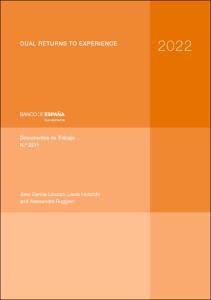Dual returns to experience
Autor
Fecha de publicación
3-mar-2022
Descripción física
62 p.
Resumen
En este documento estudiamos cómo la dualidad del mercado laboral afecta a la acumulación de capital humano y a las trayectorias salariales de los trabajadores jóvenes en España. Utilizando datos administrativos, seguimos a los trabajadores desde su entrada en el mercado laboral para medir la experiencia acumulada bajo diferentes tipos de contrato y estimamos sus rendimientos salariales. Documentamos rendimientos más bajos de la experiencia acumulada en contratos temporales en comparación con los contratos indefinidos, y mostramos que esta diferencia no se debe a la heterogeneidad inobservada de las empresas en las que trabajan ni a la calidad del emparejamiento. Por el contario, proporcionamos evidencia de que la brecha en los rendimientos se debe a una menor acumulación de capital humano cuando se trabaja con contratos temporales. Esta diferencia se amplía con la habilidad del trabajador, lo que indica una complementariedad entre experiencia y capacidad de aprendizaje. Nuestros resultados sugieren que el uso generalizado de contratos temporales reduce la adquisición de habilidades de los trabajadores altamente cualificados, lo que frena el crecimiento salarial a lo largo de su carrera profesional hasta en 16 puntos porcentuales 15 años después de su entrada al mercado laboral.
This paper studies how labor market duality affects human capital accumulation and the wage trajectories of young workers in Spain. Using rich administrative data, we follow workers from their entry into the labor market to measure the experience accumulated under different contractual arrangements and we estimate their wage returns. We document lower returns on experience accumulated under fixed-term contracts compared with permanent contracts and show that this difference is not due to unobserved firm heterogeneity or the quality of the matching. Instead, we provide evidence that the gap in returns is due to lower human capital accumulation while working under fixed-term contracts. This difference widens with worker skill, suggesting that experience and skill-learning are complementary. Our results suggest that the widespread use of fixed-term work arrangements reduces the skill acquisition of highly-skilled workers, holding back life-cycle wage growth by up to 16 percentage points 15 years after their entry into the labor market.
This paper studies how labor market duality affects human capital accumulation and the wage trajectories of young workers in Spain. Using rich administrative data, we follow workers from their entry into the labor market to measure the experience accumulated under different contractual arrangements and we estimate their wage returns. We document lower returns on experience accumulated under fixed-term contracts compared with permanent contracts and show that this difference is not due to unobserved firm heterogeneity or the quality of the matching. Instead, we provide evidence that the gap in returns is due to lower human capital accumulation while working under fixed-term contracts. This difference widens with worker skill, suggesting that experience and skill-learning are complementary. Our results suggest that the widespread use of fixed-term work arrangements reduces the skill acquisition of highly-skilled workers, holding back life-cycle wage growth by up to 16 percentage points 15 years after their entry into the labor market.
Publicado en
Documentos de Trabajo / Banco de España, 2211
Otras versiones
Materias
Dualidad del mercado laboral; Capital humano; Trayectorias salariales; Labor market duality; Human capital; Earnings dynamics; Relaciones laborales; Mercado de trabajo; España
Aparece en las colecciones:












